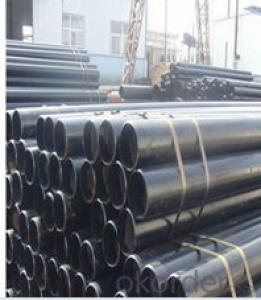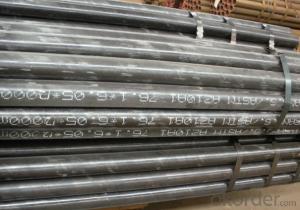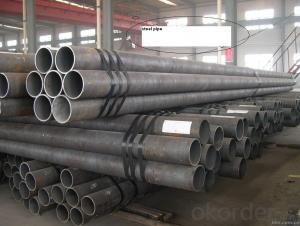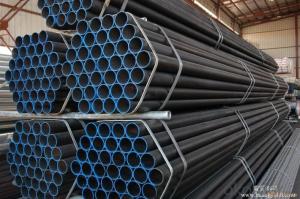High-quality Carbon Seamless Steel Pipe For Boiler 10# CNBM
- Loading Port:
- Qingdao
- Payment Terms:
- TT OR LC
- Min Order Qty:
- 10 pc
- Supply Capability:
- 30 pc/month
OKorder Service Pledge
OKorder Financial Service
You Might Also Like
Quick Details
| Thickness: | 3 - 60 mm | Section Shape: | Round | Outer Diameter: | 21.3 - 1220 mm |
| Secondary Or Not: | Non-secondary | Application: | fluid pipe,boiler pipe, structural pipe, oil/gas/water pipe etc | ||
| Technique: | Hot Rolled | Certification: | ISO9001-2000, ISO14000, ISO18000 , API 5L | Surface Treatment: | Painted, Oiled, galvanized or phosphate etc |
| Special Pipe: | API Pipe | Alloy Or Not: | Is Alloy | Technique:: | Hot rolled or cold rolled |
| Special pipe:: | API/ ASME/thickwall/oil/gas/water pipe | Length:: | 3-12m | Treatment of two ends:: | Beveled end , plain end etc |
| Brand:: | Bai Chuan | Third Party Inspection:: | BV, SGS etc. | Schedule:: | SCH10-SCH160, XS, XXS |
| Other Material:: | 10#, 20#, 16Mn, Q345 etc | Material Type:: | Carbon steel/ Low alloy steel | Producing standard:: | American/Japanese/ German/ Britain/ Chinese standard |
| Grade: | A53(A,B),A106(B,C),A210,API J55,St37,STPG42,A53-A369,API J55-API P110,ST35-ST52 | Standard: | BS EN10296,JIS G3452-2004 |
1. Out Diameter: | 21.3mm-1220mm |
2. Wall Thickness: | 3mm-60mm |
3. Length: | 3m-12m |
4. Producing Standard: |
|
5. Main Material: (Carbon Steel & Low Alloy steel) |
|
6. Special specifications: | Available according to customer’s requirements and quantity. |
7. End Shape: | Beveled end , plain end, varnished, or adding plastic caps to protect the two ends as per customer’s requirements. |
8. Surface treatment: | Painted, Oiled, galvanized, phosphate etc. |
9. Usage: |
|
10. Certificates: | ISO9001-2000, ISO14000, ISO18000, API 5L certificate |
11. Third party inspection: | Welcome you to send a third party inspecting company (BV, SGS etc) to check the quality of our final products. |
12. Pictures: | our producing flow chart, our factory, production line, inspecting equipments, our products are listed below for your reference. |
- Q:How are steel pipes measured and labeled?
- Steel pipes are typically measured and labeled based on their nominal pipe size (NPS), which refers to the inner diameter of the pipe. This measurement is expressed in inches or millimeters. Additionally, steel pipes are often labeled with their schedule or wall thickness, which is represented by a numerical value. The labeling also includes the pipe material, such as carbon steel or stainless steel, and may include other specifications and markings as required by industry standards and regulations.
- Q:Can steel pipes be used for underground gas distribution?
- Yes, steel pipes can be used for underground gas distribution. Steel pipes are commonly used for gas distribution as they are strong, durable, and can withstand high pressure. Additionally, steel pipes have excellent resistance to corrosion, which is crucial for underground installations. However, it is important to ensure proper coating and insulation to prevent any potential damage or leakage.
- Q:What does carbon seamless steel pipe mean? What is the difference between a seamless 20# and an ordinary one? What is it used in detail?
- In general, steel is divided into two groups according to their chemical composition: carbon steel and alloy steel;(1): carbon steel low carbon steel (C = 0.25%); carbon steel (0.25% < C < 0.60%); high carbon steel (C = 0.60%)(2): alloy steel, low alloy steel (alloy is less than or equal to 5%); in steel (5% < < 10% alloy; high alloy steel (alloy) = 10%)Carbon seamless steel tubes are mostly pipes for mechanical engineering structures and pipes for conveying fluids.
- Q:How are steel pipes used in the aerospace industry?
- The aerospace industry extensively utilizes steel pipes for various purposes. Aircraft frames heavily rely on steel pipes as they offer the necessary strength and structural integrity. Steel pipes find applications in the fuselage, wings, and landing gear of airplanes, as well as in rocket launch vehicles and space shuttles. The aerospace industry favors steel pipes due to their exceptional strength-to-weight ratio. They possess lightweight properties while maintaining immense strength, enabling the construction of robust and dependable aerospace structures. This aspect proves crucial in the industry as weight reduction significantly improves fuel efficiency and overall performance. Steel pipes also serve the purpose of transporting fluids and gases within aircraft systems. They commonly operate in the hydraulic and fuel systems, facilitating the flow of vital fluids like hydraulic fluid, fuel, and coolant. By ensuring the safe and efficient movement of these fluids throughout the aircraft, steel pipes contribute to its proper functioning and performance. Furthermore, steel pipes find utility in the aerospace industry for heat transfer applications. They form an integral part of the aircraft's cooling systems, aiding in the dissipation of heat generated by engines, electrical components, and other systems. With their exceptional thermal conductivity, steel pipes effectively transfer heat away from critical areas, preventing overheating. In conclusion, steel pipes possess a crucial role in the aerospace industry. They contribute to aircraft construction by providing strength and structural integrity, as well as facilitating fluid and gas transportation and heat transfer. The utilization of steel pipes in the aerospace industry ensures the safety, efficiency, and reliability of aerospace structures and systems.
- Q:Are steel pipes suitable for conveying fluids?
- Steel pipes are well-suited for the transportation of fluids. They have been extensively utilized across various industries for numerous years due to their robustness, strength, and resistance to corrosion. These characteristics render steel pipes an optimal choice for the conveyance of fluids like water, oil, gas, and hazardous substances. Moreover, the sleek interior surface of steel pipes facilitates smooth flow and prevents blockages, thus making them appropriate for applications that necessitate uninterrupted and seamless fluid movement. Additionally, steel pipes can endure high-pressure and high-temperature conditions, enabling their use in both high and low-pressure fluid transmission systems. In summary, steel pipes are a dependable and efficient alternative for fluid conveyance in a wide array of industries, including oil and gas, water treatment, chemical processing, and many others.
- Q:How can steel pipes be protected from corrosion?
- Steel pipes can be protected from corrosion through various methods. One common method is the application of protective coatings. These coatings act as a barrier between the steel and corrosive elements in the environment. The most widely used protective coating for steel pipes is epoxy, which provides excellent resistance to corrosion. Other coatings such as polyethylene and polyurethane can also be used depending on the specific application and requirements. Another effective way to protect steel pipes from corrosion is by cathodic protection. This technique involves the use of sacrificial anodes or impressed current systems to prevent corrosion. Sacrificial anodes, typically made of zinc or aluminum, are attached to the steel pipes. These anodes corrode instead of the steel, sacrificing themselves to protect the pipes. Impressed current systems, on the other hand, use a direct electrical current to counteract the corrosion process. Regular maintenance and inspection are crucial in the protection of steel pipes from corrosion. Monitoring the condition of the coatings, checking for any signs of damage or deterioration, and promptly addressing any issues can help prevent corrosion from occurring or spreading. Additionally, implementing proper drainage systems to avoid the accumulation of moisture around the pipes can further protect them from corrosion. Lastly, environmental factors should be taken into consideration when protecting steel pipes from corrosion. This includes mitigating exposure to corrosive substances, such as acids or chemicals, and ensuring proper ventilation and airflow to prevent the buildup of moisture and humidity. By implementing a combination of these protective measures, steel pipes can have an extended lifespan and maintain their structural integrity.
- Q:Can steel pipes be used for oil well casing?
- Yes, steel pipes can be used for oil well casing. They are commonly used in the oil and gas industry due to their durability, strength, and ability to withstand high pressure and extreme conditions found in oil wells.
- Q:How are steel pipes joined together?
- Steel pipes are commonly joined together using various welding techniques, such as arc welding, butt welding, or socket welding. Additionally, other methods like threaded connections, flanges, or mechanical couplings can be used for joining steel pipes.
- Q:What are the advantages of PVC pipe and galvanized steel pipe?
- PVC pipeline use temperature is -5 to 90 degrees or so, according to the current market price of around 6000 yuan per ton, the price is cheap. Its corrosion resistance is good, can resist most of the acid and alkali, and unlike the steel pipe that is easy to rust, so in the construction of the upper and lower water pipes and other fields have gradually replaced the trend of steel pipe.
- Q:Are steel pipes suitable for use in food processing industries?
- Yes, steel pipes are suitable for use in food processing industries. They are highly durable, corrosion-resistant, and can withstand high temperatures and pressure. Additionally, steel pipes are easy to clean, maintain hygiene standards, and do not contaminate the food being processed.
1. Manufacturer Overview |
|
|---|---|
| Location | |
| Year Established | |
| Annual Output Value | |
| Main Markets | |
| Company Certifications | |
2. Manufacturer Certificates |
|
|---|---|
| a) Certification Name | |
| Range | |
| Reference | |
| Validity Period | |
3. Manufacturer Capability |
|
|---|---|
| a)Trade Capacity | |
| Nearest Port | |
| Export Percentage | |
| No.of Employees in Trade Department | |
| Language Spoken: | |
| b)Factory Information | |
| Factory Size: | |
| No. of Production Lines | |
| Contract Manufacturing | |
| Product Price Range | |
Send your message to us
High-quality Carbon Seamless Steel Pipe For Boiler 10# CNBM
- Loading Port:
- Qingdao
- Payment Terms:
- TT OR LC
- Min Order Qty:
- 10 pc
- Supply Capability:
- 30 pc/month
OKorder Service Pledge
OKorder Financial Service
Similar products
New products
Hot products
Related keywords
































